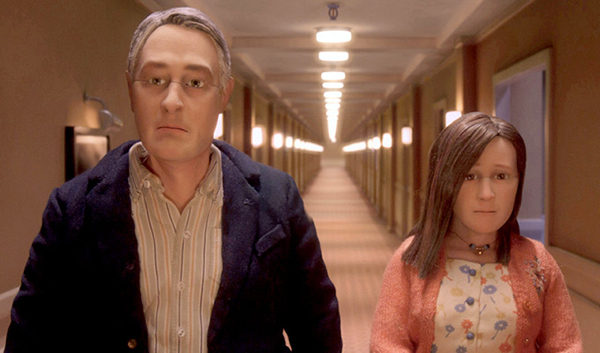Movie review by Greg Carlson
WARNING: The following review reveals key plot information. Read only if you have seen “Anomalisa.”
Like so many of the curious, distinctive places imagined and created for his films, the universe of Charlie Kaufman’s “Anomalisa” is simultaneously familiar and strange, recognizable and alien, inviting and terrifying. Based on Kaufman’s 2005 play, the film adaptation is codirected by Kaufman and stop-motion practitioner Duke Johnson, and has the distinction of being the first R-rated movie to receive an Academy Award nomination for Best Animated Feature. Even at a tidy 90 minutes, “Anomalisa” is on several levels as thought-provoking as Kaufman’s “Synecdoche, New York,” the polarizing cult film that also grapples with questions of desire, self-worth, cognition, and identity.
“Anomalisa” follows speaker and customer service author of “How May I Help You Help Them?” Michael Stone (David Thewlis) during a one-night engagement in Cincinnati. In a series of scenes that unfold mostly in real time, Michael arrives at a hotel called the Fregoli, another of Kaufman’s frequently deployed linguistic/terminological Easter eggs, this one a reference to the psychiatric delusion that multiple individuals are actually just one person who can change appearance. Francis Fregoli was also Kaufman’s nom de plume on the original play script.
At the hotel, every banal encounter unfolds with a sense that there is something else as uncanny as the head and facial designs of the fascinating 3D printed puppets. But the intricately fabricated sets and armatures are only one facet of a central auditory conceit that informs any reading of the cinematic text. Some critics have opted to refrain from discussing what Richard Brody describes as a “coup de theatre too clever to divulge,” but the “technical gimmick” of using Tom Noonan as the voice of every character Michael encounters until he hears the unique and euphonious Lisa (Jennifer Jason Leigh) is the aspect of “Anomalisa” that will have you reflecting for days.
Michael’s excitement at hearing Lisa distinctly from all others, including his wife and his child, leads to some of the movie’s most discussed touches, including a lovely moment in which Lisa sings an intimate rendition of “Girls Just Want to Have Fun” that makes Michael’s eyes sparkle (an absolute blessing in disguise when the filmmakers were not able to license “My Heart Will Go On,” which was used in the play). But the more time we spend, the greater our discomfort at Michael’s “condition.” An unsettling late callback to a scene in which Michael spots an unusual mechanical sex doll while looking for a gift to bring home to his son is pure Kaufman – a hall of mirrors in which we watch an inanimate object regard an automaton and start to wonder whether we are all Michaels.
Kaufman deliberately resists the kind of homogeneity and polish that would more smoothly align the sympathies of the audience with Michael. Instead, the character’s selfishness, uncertainty, and privilege are displayed in such a way to allow for a wide range of readings and interpretations of authorial intent. Is Michael a bad person? Are we all bad people? Thewlis, Noonan, and Leigh, reprising their roles from the Theater of the New Ear production, are all so good that once you see “Anomalisa” you might believe the members of the Academy nominated Ms. Leigh for the wrong movie.
